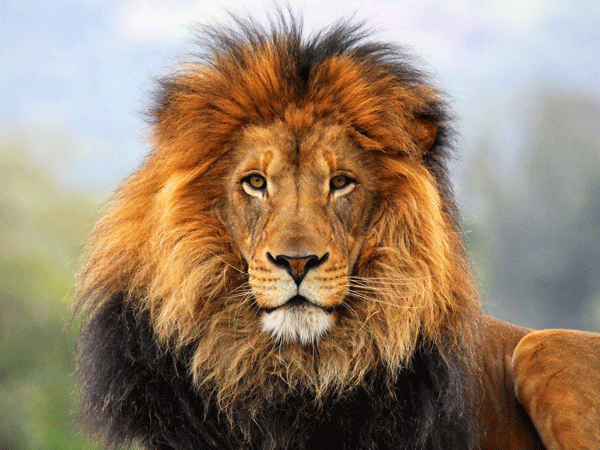David Bristow, environmental writer and author of Africa’s Finest, aptly describes the tragedy that would strike the African continent should it become barren of lions. “Indeed, the entire energy of the planet would be diminished in some way – and so would we, without the one other species against which we have always found the measure of ourselves”. For humans to compare aspects of themselves to the instinctive power of a lion is a comparison that needs to be deserved. When kings, chiefs and tribal leaders don the symbol, or anciently, the skin of a lion, it is worn with a sense of achievement – an indication of royalty and respect. Isn’t it strange that humans do not then assign the same, if not a higher level of admiration to the real thing, to the animal itself?
This devastating loss of lions on the planet is a reality we will face in the very near future, should we not start acting like we value the lives of lions. We so desire an association with this animal king, yet it is purely due to the behaviour of humans, that we are confronted by a severely compromised future without lions. Part of what makes me a proud African is the representation of my continent by the wildest of wild animals, the endless horizons of the savannah and the aortic bond with Mother Earth herself. Even a continent as large and seemingly insatiable as Africa is being threatened by the weight of an ever-expanding human population. In fact, it has the fastest growing population in the world, but it is ill-equipped to manage the human demand for survival. What it offers is space – its vast plains, its fertile soil and its apparently unoccupied surface. The massive human encroachment into the area we know as the savannah has diminished this wilderness by 75%.
Fiery sunsets stain the skies, melting like lava over the far-reaching African horizon. One imagines the songs from the skies, the hissing cicadas and the distant calls that introduce the activity of the night. A lion’s reverberant roar can travel as far as 10 kilometres and they naturally roam territories as large as 260 square kilometres, but with the constant spread of human settlements into previously wild land, territories and farmland are overlapping, resulting in the loss of lion lives to such an extent that it is contributing to their looming demise. Grasslands have shrunk to a quarter of the size they used to be and with that, the lands that lions call home have been taken away and replaced by cultivated soils and grazing fields for cattle.
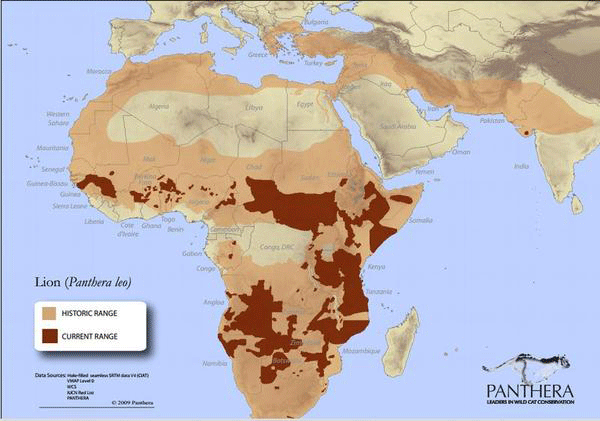
Lions used to roam the entire continent and parts of Eurasia, but recent studies reveal a shocking reality that depicts the loss of 95% of these lions – the remainder of whom are restricted to sub-Saharan Africa. Using satellite imagery, the populations of humans inching further and further into the savannah can be seen, while merely 67 isolated areas contain communities small enough to accommodate the existence of lions. Only 10 specific areas in South Africa and East Africa – mostly the Kruger National Park and the Serengeti – provide environments that can sustain the survival of lions. The rate at which the lion is losing its habitat is faster than the rate at which the world’s tropical rainforests are being destroyed. What is most terrifying about this specific reason for the annihilation of the lion is that humankind is increasing at an unstoppable rate and it will only continue to encroach onto the remaining savannah.
Dereck Joubert, National Geographic Explorer-in-Residence and founder of the Big Cats Initiative, speaks of the almost entire loss of lions in West Africa, where there remain less than 500. When asked about the most destructive forces facing lions in Africa, he answers with, “Habitat – slash and burn farming especially in West Africa kills predators, kills wildlife and then leaves the land bare. In all cases I think we can cite ignorance, lack of respect and greed.” The lions in West Africa are genetically unique and are the closest in relation to the Asiatic lion, whose future is even more perilous than that of the African Lion.
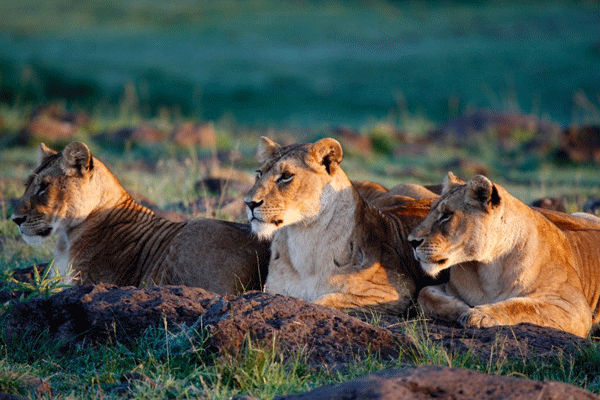
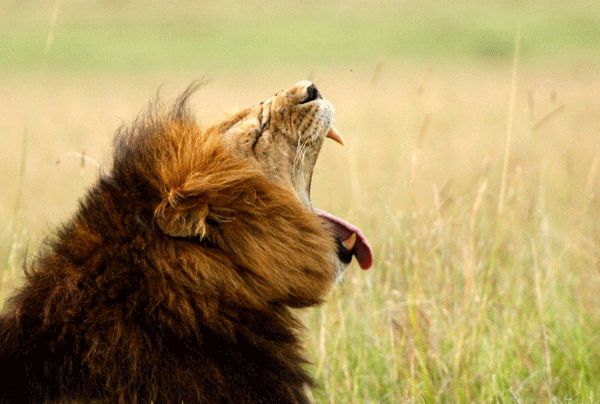
On the opposite side of the continent, David Bristow speaks of Kenya’s population issues when asked about the primary reason for lions’ endangerment: “Human population growth leading to habitat destruction… Kenya is currently the worst case scenario – more people, more cattle and wheat-fields, less natural habitat and fewer lions.”
Land conversion is suffocating the breath of ecosystems that are imperative to the survival of many species; therefore, contributing directly to a doomed future for lions. As lions are pushed out of their increasingly restricted space, they come into contact with livestock taken out to graze, resulting in the predator being shot in retaliation by the herder. Contributing further to the conflict created by loss of habitat is that the prey species relied upon by lions are favoured by people living in the areas, too. Thomas Lovejoy, ecologist and member of the Big Cats Initiative, has spoken about the illegal utilisation of game species having reached commercial capacities, yet the practice is unrivalled by proportional prosecution. Competing for place and prey with the all-powerful mankind – the Kings of the continent do not stand a chance without our help.
Leaders in the field of conservation are alerting us of the perilous future of Africa’s biggest cat – an irreplaceable species that we claim to so admire and adore. An animal that dictates the health of ecosystems and the wealth of African countries. Dereck Joubert depicts the bitter economic reality of our future without lions:
“There is an $80 Billion a year ecotourism revenue stream into Africa. Most of that is based on the safari business. Most of that is based on savannah ecosystem activities. Most of the attractions to those landscapes are lions. If you told your guests they can visit Africa but stand no chance of seeing a lion, that revenue stream will dip substantially. When that happens, communities that surround the parks and viable wildlife places today, will become poorer and need more help. As they diminish in wealth they will become (and do become) sicker and further require government assistance. Poor sick people don’t hold down jobs. They poach. So behind predator disappearances, plains game numbers will decline. Parks fail and revenues to governments decline. As that happens the importance declines and parks will be cast aside, and collapse. Africa’s mega population (the fastest growing in the world) will be poor, unhealthy and clustered in megacities with the outdoors behind them, left devoid of life.”
Those are the facts of an Africa sans its lions. And if the reality of a diminished economy supporting the highest growing population of people in the world is not what switches on the light bulb, there is an equally as devastating environmental downfall that will follow the extinction of the lion. Dereck Joubert explains:
“Take out the large cats and migrating species and other moving herds in some cases stop that movement. Initially large herbivore numbers increase, even balloon. Medium scale predators (hyenas, jackals) increase because of lack of ceiling to their growth usually provided by predators Medium prey collapses under the weight. Medium predators follow. Large herbivores become a mono-culture in environments. Their lack of movement means they sleep, eat and defecate in one spot and their parasite loads increase. Weak and genetically poor breed, and in time an entire ecosystem collapses. If this happens in isolation of man, this scenario is linear. If man intervenes it goes up and down and delays the collapse, but the result is the same and one that can be avoided by protecting big cats.”
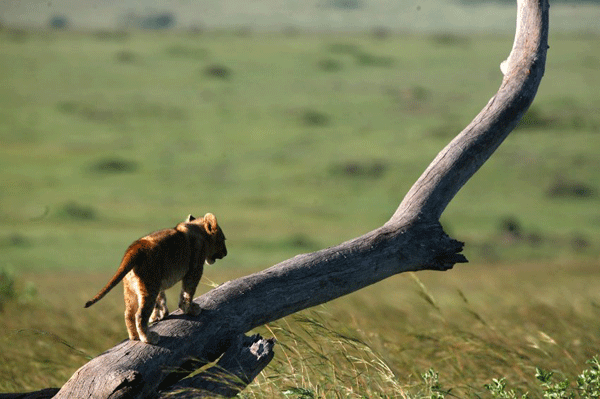
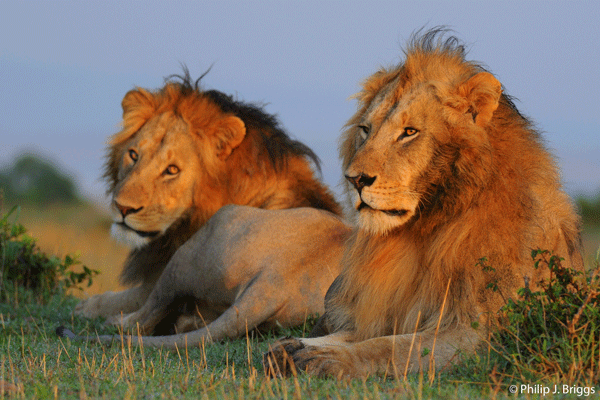
I had the pleasure of talking to both Dereck and David in preparation for upcoming articles, and I was enlightened by their studied opinions and the conclusions that have been born of their dedicated life’s work. A third perspective I was thrilled to gain was that of Adam Cruise – environmentalist, travel writer and student of Philosophy. He reminded me of the ethical matters that are so integral in solving the snowballing issue of losing lions.
“Is it not our collective duty? We need to protect lions as we would protect other humans, after all what is Africa without its lions? The straight answer is it won’t be Africa anymore. We all know it’s wrong to treat humans based on the difference of intelligence, colour, creed or gender, so why not apply the same for animals? Therefore, lions ought to have a moral value of equal importance to humans because they are, like us, a living being, one that defines Africa, as well as inter-meshed in our global, cultural, symbolic and linguistic psyche. They are a vital and essential member of a natural ecosystem and an integral and intrinsic part of a living community we all share.”
Chloe Cooper

